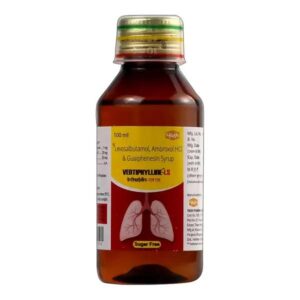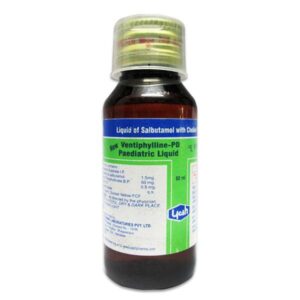SALBUTAMOL + MENTHOL + CHOLINETHEOPHYLLINATE
Salbutamol: Salbutamol is a medication commonly used to treat respiratory conditions such as asthma, chronic obstructive pulmonary disease (COPD), and bronchospasm. It is sold under various brand names, including Ventolin, Proventil, and ProAir.
The primary use of Salbutamol is to relieve and prevent bronchospasm, which is the temporary narrowing of the airways in the lungs. It is classified as a short-acting beta-2 adrenergic agonist. When inhaled, Salbutamol acts as a selective stimulant of beta-2 adrenergic receptors in the smooth muscle of the airways. This causes relaxation of the smooth muscle, dilation of the airways, and improved airflow into and out of the lungs. It also helps to reduce inflammation in the airways.
Salbutamol is available in multiple forms, including inhalers, nebulizer solutions, and tablets. The appropriate dose and delivery method depend on the individual and their specific condition. Inhaled forms are the most common and are typically administered via an inhaler or nebulizer device. The dose may vary, but it is usually recommended to inhale 1-2 puffs every 4-6 hours, as needed for symptom relief.
While Salbutamol is generally considered safe and effective, it can have some side effects. Common side effects may include tremors, nervousness, dizziness, headache, rapid heart rate, and muscle cramps. These side effects are usually mild and temporary. However, if you experience severe side effects such as chest pain, irregular heart rhythm, or difficulty breathing, it is important to seek medical attention immediately.
Some individuals may be more susceptible to side effects, such as those with a history of heart conditions, high blood pressure, or certain thyroid disorders. It is essential to inform your healthcare provider of any pre-existing medical conditions or medications you are taking before starting Salbutamol.
In summary, Salbutamol is a widely used medication for the treatment of respiratory conditions such as asthma and COPD. It works by relaxing the airway muscles, improving airflow, and reducing inflammation. Proper dosage and delivery method should be determined by a healthcare professional, and potential side effects should be monitored closely.
Menthol: Menthol is a natural compound derived from the peppermint plant. It is widely used in the pharmaceutical industry for its cooling and soothing properties.
Use:
Menthol is commonly used topically to relieve minor skin irritations, such as itching and rash. It is also a common ingredient in cough drops, lozenges, and topical analgesic creams. Additionally, it is used as a flavoring agent in various products like gum, toothpaste, and mouthwash.
Mechanism of Action:
Menthol works by stimulating the cold-sensitive receptors in the skin, leading to a cooling sensation. It does not directly decrease the temperature, but rather causes a perception of coolness. This sensation helps to alleviate discomfort and provide temporary relief from pain or itching.
Dose:
The dose of menthol depends on the specific product being used. For topical analgesic creams, the recommended application is typically 3-4 times a day, or as directed by a healthcare professional. For oral products like cough drops or lozenges, the recommended usage instructions should be followed.
Side Effects:
Generally, menthol is well-tolerated when used as directed. However, some individuals may experience mild side effects, which can include skin irritation, rash, or a burning sensation. In rare cases, allergic reactions may occur, leading to more severe symptoms like swelling, difficulty breathing, or hives. If any of these symptoms occur, medical attention should be sought immediately.
It is important to note that menthol should not be ingested in large quantities or applied to broken or damaged skin, as it can cause irritation or potential systemic effects in excessive doses. Additionally, it is advisable to consult a healthcare professional before using menthol products, especially if you have known allergies or sensitivities.
Cholinetheophyllinate: Cholinetheophyllinate is a drug that combines theophylline, a bronchodilator, with choline, a natural substance found in the body. It is primarily used to treat various respiratory conditions such as asthma, chronic bronchitis, and emphysema.
The mechanism of action of cholinetheophyllinate involves stimulating the smooth muscles in the airways, causing them to relax and widen. This helps to alleviate symptoms such as wheezing, coughing, shortness of breath, and chest tightness associated with respiratory conditions. Additionally, theophylline has anti-inflammatory effects that can further help to reduce airway inflammation.
The recommended dose of cholinetheophyllinate varies depending on the specific condition being treated and individual patient factors. It is commonly available in tablet or capsule form and is usually taken orally. The dosage should be carefully adjusted by a healthcare professional based on the patient’s response and tolerance to the medication.
Like any medication, cholinetheophyllinate can have side effects. Common side effects may include nausea, vomiting, gastrointestinal upset, headache, dizziness, and irritability. These side effects are generally mild and tend to improve with continued use or by adjusting the dosage. However, in some cases, more serious side effects can occur, including rapid heartbeat, chest pain, seizures, or allergic reactions. If any severe side effects occur, it is important to seek medical attention immediately.
It’s worth noting that cholinetheophyllinate can interact with other medications, including certain antibiotics, seizure medications, and heart medications. It is important to inform the healthcare provider about all current medications and underlying medical conditions to avoid potential drug interactions or complications.
Overall, cholinetheophyllinate can be an effective treatment option for individuals with respiratory conditions, but it should only be used under the supervision of a healthcare professional who can monitor the response and manage any potential side effects.



